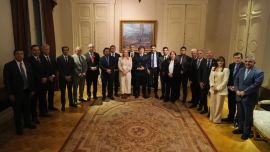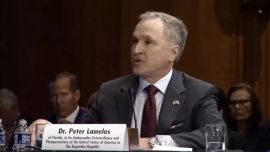On her very first day as a resident doctor, Sol P. performed an abortion. Today, she is an advocate for women to have the right to choose, keeping her mobile phone on each night in case a patient calls.
Hailing from a well-off family that openly discussed abortion, Sol took up the cause barely out of her teens. But it wasn’t until before her graduation that she says understood what it really meant. While on call in a medical teaching unit, she saw two women checked in with Mondor’s syndrome, the consequence of infected clandestine abortions. They both died from septic shock. “To me, it was tragic,” she says. “How can things like that happen when there are available resources in every hospital?” On her last day as a medical student, Laura L. swore an hippocratic oath to respect human life. She has never performed the procedure that makes up so much of Sol’s identity. And, she says, she never will.
Raised as a committed member of the Catholic faith, Laura always had a straightforward view of abortion: she thought it was wrong. It was in medical school where that conviction took root, turning into her rigid professional ethics: she saw a 14-week-old foetus expelled during a medical abortion. The “wrongness of it all” was her dealbreaker.
Both wish to remain anonymous, as they are wary of of speaking out publicly. And both stand on different ends of a political and ideological fault-line that currently splits Argentina.
The debate over the decriminalisation of abortion sears a tautological divide in Pope Francis’ homeland. Ever since legislation on the issue was first introduced into Congress, Argentina has become a nation of binary passions, embodied through the rival camps of campaigners and their respective colours (light blue for the pro-life movement, green for the pro-choice movement). As the August 8 vote has drawn closer, doctors and physicians have played a key role as potential effectors of change.
The country now stands on the verge of a historical vote in the Senate: on Wednesday, the text of an abortion rights bill will be approved or rejected by lawmakers in the upper chamber. With 36 of the 72 senators now publicly opposing the bill, the fight for safe and legal abortion stands on a knife’s edge in the most intense legislative week of the year.
The turbulent national landscape has fuelled debate among medical professionals and, unsurprisingly, there is division there too. The Argentina Medical Society has endorsed the bill and Health Minister Adolfo Rubinstein has openly stated that “decriminalisation reduces maternal mortality and the total number of abortions,” yet the Academy of Medicine and 300 private hospitals have strongly rejected the measure. ---
Laura, a 29-year-old doctor, falls on latter side of the debate. “There is no doubt human life begins at conception. Destroying a human foetus is murder,” she told the Times. “We doctors can’t defend anyone’s death: that’s what we swear when we graduate: to respect life and the laws of humanity, even under threat. I’m a doctor, not a murderer.”
Last weekend, Laura was one of hundreds of protesters that gathered outside the Olivos Presidential Residence for a ‘chaquetazo’ protest. Wearing the pro-life campaigns’ lightblue hankerchiefs around their necks and heads, demonstrators demanded President Mauricio Macri reject the bill, warning him: “Don’t count on us to kill Argentines.”
For Laura, rejecting a law that would enable “mass murder” is a “professional responsibility.”
Currently, abortion is legal in Argentina only under very limited circumstances, such as in case of rape, abuse, and risks to a woman’s health. Laura says she opts out of performing legal terminations of pregnancies.
And if the bill before the Senate passes? “In the worst possible scenario,” she responds, she will remain a conscientious objector. ---
Sol, 27, works as a resident in a CeSAC centre (Centre for Health and Community Action), one of the public health outposts that are scattered across Buenos Aires City. She says she is regularly in “contact with harsh social reality.”
She performs abortions as per the 2015 protocol laid out by the Health Ministry, which issued guidelines as in response to a 2012 Supreme Court ruling that expanded abortion rights to all rape victims, not just the mentally impaired.
Carrying out the procedure comes at a cost. Sol says she has been labelled as an ‘abortera’ by her colleagues and that both patients and doctors face constant attempts to block abortions, even if a termination is legal. If a judge considers and abortion to be illegal, both parties can be prosecuted and face four-year jail terms.
“I’m not scared,” says Sol. Clandestine abortions are the leading cause of maternal mortality and they disproportionately affect women who are less well-off, she says. The estimated 500,000 procedures carried out each year in Argentina are, for her, “a serious public health emergency that leads to the death of many women, especially poor women.”
The cases she deals with affect her personally. “Every case is heartbreaking. They are horrible situations filled with violence. And when you think it can’t get worse, it does,” she says. ---
Whether lawmakers vote to approve the legislation on Wednesday or not, clandestine procedures will continue. Money can be a deciding factor not only in how they are undertaken but in the safety of patients’ lives.
There are two main ways to terminate pregnancies. Barring legal medical interventions, the safest alternative is an abortion procedure in a private office, either by pills, vacuumaspiration, or the less frequent curettage. Such procedures could still cause complications. The other is seeking to self-induce a miscarriage, either by buying pills or inducing contractions – usually, with celery stems, hangers, or knitting needles.
Enquiries carried out for this article revealed that a clandestine abortion can range from as low as 3,000 to 35,000 pesos. In contrast, buying a set of misoprostol pills, the chief drug used for pharmacological abortion, costs 2,800 pesos on the official ANMAT list. For many women, “especially those from vulnerable environments,” Sol adds, that’s not even a possibility.
“There’s women who can choose and pay for a clandestine abortion in a dignified environment, enabling them to the right to medical assistance. Then, there’s the woman who can’t choose, who can’t pay. Women who don’t have a place to live, food to eat, that get beaten up by their husbands. Those are the women who need legal interruption of pregnancy. And they are also the ones who die,” Sol reflects.
In these vulnerable social conditions, rape is a common occurrence, as is sexual and physical violence in marriages. As per the 2015 protocol set out by the Health Ministry, abortions are legal in such cases.
Laura doesn’t think they should be. “This law does not protect an abused woman or child: it protects the rapist and enables a never-ending cycle of abuse. The fact that women don’t need to press charges to get abortions let many rapists get away unscathed. This is especially terrible considering 80 percent of abuses occur within families. Killing the innocent unborn child doesn’t solve anything,” she stresses.
“Women in such conditions need medical, psychological and economical support. Solutions like expediting adoption processes, sound educative measures, and protecting vulnerable motherhood, do not violate the unborn child’s right to live,” she adds.
For her, the only solution to these underlying social issues is a “present State in vulnerable locations.”
Even though it is a situation
that must be recognised and
dealt with by the State, both are
committed to their responsibilities
as doctors. So that “the
professionals of the public
health system can guarantee
the right to health for every patient,
so that women can decide
over their bodies,” Sol advocates
for the bill. “As a doctor, I see
two lives,” Laura counters.
“They both deserved to be
saved, so that’s what I will do.”
related news





















Comments